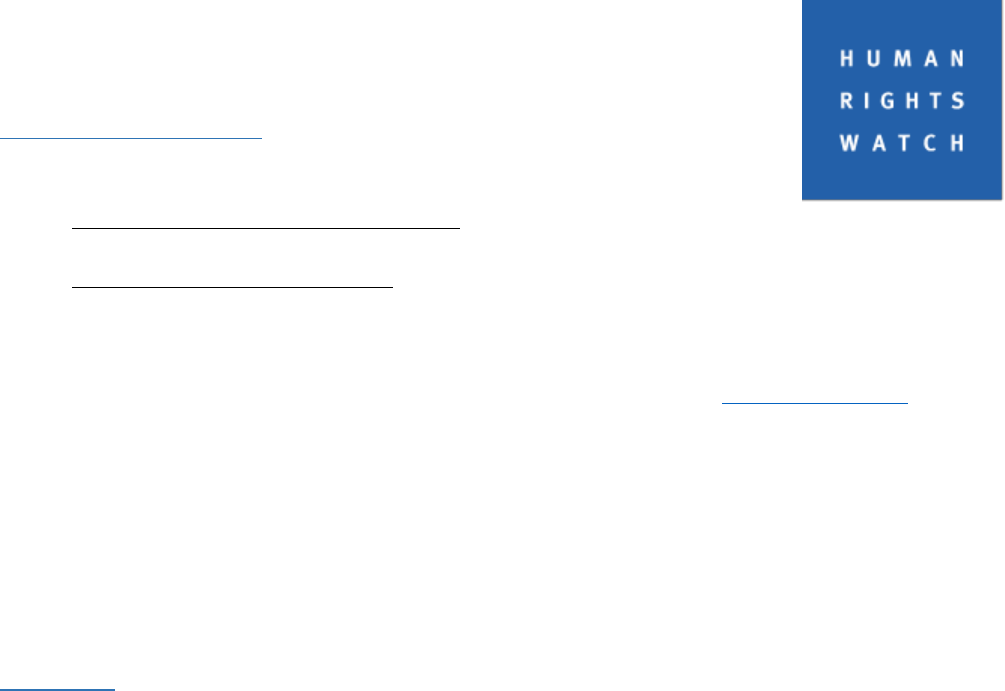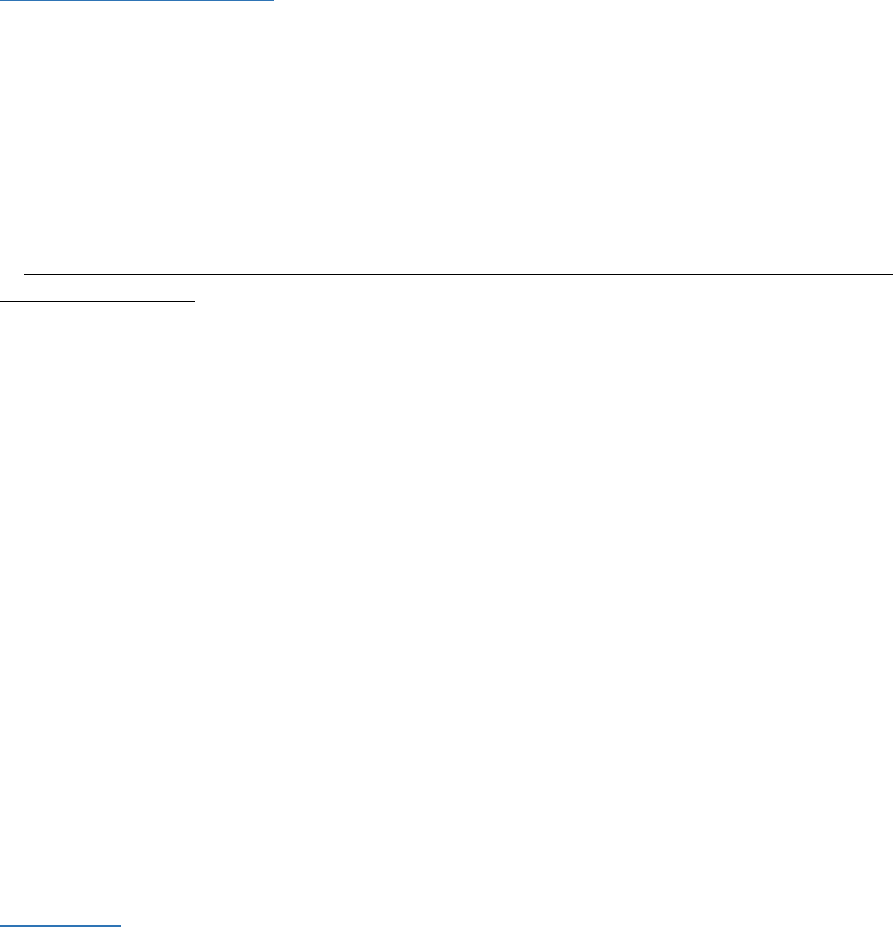
HRW Fellowships in International Human Rights - FAQs
General Information
Q: How many fellowships does HRW offer?
A: Human Rights Watch currently offers two fellowships:
• Alan R. and Barbara D. Finberg Fellowship – a one-year fellowship open to candidates who
hold an advanced (graduate) degree from any institution;
• The Leonard H. Sandler Fellowship – a one-year fellowship only open to candidates who
hold a J.D. from Columbia Law School; and
Q: Can I speak to someone from the Fellowship Committee?
A: You can send inquiries by email for the Finberg and Sandler Fellowships to fellowship@hrw.org.
Inquiries regarding status of applications will go unanswered. Unfortunately, given the volume of
applications, Human Rights Watch is not able to respond to calls or emails with questions about
individual applications.
Q: May I apply for more than one fellowship?
A: You may apply for more than one Human Rights Watch fellowship in any given fellowship year.
You should submit separate, complete applications for each fellowship for which you intend to
apply (the application materials may be identical).
Eligibility
Q: Do you accept non-US nationals to be considered for HRW fellowships?
A: Yes. The fellowships are open to citizens of all nationalities who meet the eligibility criteria.
Human Rights Watch will assist prospective fellows in obtaining the necessary work authorization.
Q: I am not a native English speaker. Will this put me at a disadvantage while applying for a
fellowship?
A: While a high level of English fluency is essential for our fellowships, we do not require native-level
fluency. Non-native English speakers are encouraged to apply.
Q: What degree is required to be eligible for the fellowships?
A: For the Sandler Fellowship, prospective fellows must hold a JD from Columbia Law School or have
a degree granted by June 2022. (LL.M.s are
not eligible).
For the Finberg Fellowship, applicants must hold an advanced (graduate) degree in the fields of law,
journalism, international relations or other relevant studies at the master's level or have a degree
granted by June 2022. Graduates with LL.B. degrees or advanced degrees in other relevant
disciplines may also be considered.
Q: What counts as experience conducting interviews?
A: All applicants for the Human Rights Watch fellowships should have direct experience interviewing
victims and survivors of human rights abuses. Examples of relevant interviewing experience include:
- Interviewing victims of human rights abuses for human rights reporting or news articles;
- Interviewing clients through legal aid clinics or similar settings;
- Conducting refugee status determinations; or
- Conducting interview-based academic research or other research.
Those applicants without direct interviewing experience will not be considered for any of HRW’s
fellowships.

Application Materials
Q: To whom should I address my cover letter?
A: Applicants may address their cover letter to the Human Rights Watch Fellowships Committee.
Q: Should I propose a specific project/area of interest in my application?
A: Your application should describe your interest in and qualifications for the fellowship. If you are
selected as a fellow, Human Rights Watch will pair you with a regional or thematic division based on
institutional needs, taking into account your area(s) or expertise and language skills as appropriate.
Q: Are there any guidelines on the content or form of the writing sample?
A: Applicants should submit only one unedited writing sample. The writing sample should be no
longer than 10 pages. The writing sample may be an excerpt from a longer work. Your writing sample
should reflect your commitment and experience in the field of human rights (no legal briefs, please).
While it may be useful to include citations, it is not strictly necessary, depending on the content of
the submission.
If you wish to submit a document which has been published, for example in a law journal,
newspaper, or magazine, you must submit your original version i.e., the article prior to editing by
others.
Q: When do I submit the letters of recommendation?
A: Only shortlisted candidates will be asked to submit two letters of recommendation. A letter of
recommendation is a letter written by someone who knows you in a professional or academic
capacity testifying to your qualifications and suitability for a fellowship position.
Q: When do I submit my school transcripts?
A: Only shortlisted candidates will be asked to submit transcripts. Official transcripts are stamped or
signed documents from your university confirming your grades/marks and your degree(s). Please do
not include copies of diplomas or degree certificates. If an official transcript(s) of your graduate work
is not yet available, please include an official transcript of your undergraduate work and an official
letter from your graduate program confirming your enrollment and, if possible, a list of your graduate
school courses. If the transcript is not in English, please provide the original and a certified
translation.
Interview
Q: What happens if I am invited for an interview?
A: Due to COVID-19, interviews may not take place in-person; shortlisted candidates may be
interviewed remotely via video. If interviews take place in-person, Human Rights Watch will make
the necessary arrangements and cover reasonable travel costs (including meals and lodging) for you
to attend an interview in New York City.
Q: When will I hear the results of my application?
A: Interviews will be held in November 2021 for the Sandler Fellowship and mid-December 2021 to
early-January 2022 for the Finberg Fellowship. Final decisions will be announced in November 2021
for the Sandler Fellowship and January 2022 for the Finberg Fellowship. Please note that short-listed
candidates will be contacted directly by phone or e-mail.

During the Fellowship
Q: If I am selected as a fellow, will Human Rights Watch pay for relocation and work authorization
costs?
A: Yes. Human Rights Watch will assist with and pay for obtaining work authorization. If an employee
is asked to relocate by the organization, Human Rights Watch may pay certain relocation expenses
upon prior approval of the Chief People Officer, such as:
• Economy travel to the new location
• The cost of shipping personal belongings and business files to the new location
• Temporary, short-term accommodations at the new location
Q: How does Human Rights Watch’s Fellowship program embrace diversity?
A: Human Rights Watch’s strength comes from our diversity. We welcome candidates from all
backgrounds, and we do not discriminate on the basis of ability, age, gender identity and
expression, national origin, race and ethnicity, religious beliefs, sexual orientation, or criminal
record.
Q: What kind of support do Fellows receive during their fellowship period?
A: Human Rights Watch provides all fellows with training and mentorship, including intensive
training on how to conduct human rights research using Human Rights Watch’s methodology, as
well as advocacy, communications, and publishing trainings. All fellows also receive regular and
timely feedback and guidance on professional growth throughout the one-year fellowship.
Post- Fellowship
Q: Are there possibilities of full-time employment at Human Rights Watch at the end of the
fellowship year?
A: Fellows may apply for opportunities at Human Rights Watch if they meet the qualifications for the
position(s). However, there is no guarantee of future employment with HRW. Fellows often find
employment with other human rights organizations, international organizations, or academic
institutions, depending on their qualifications.
